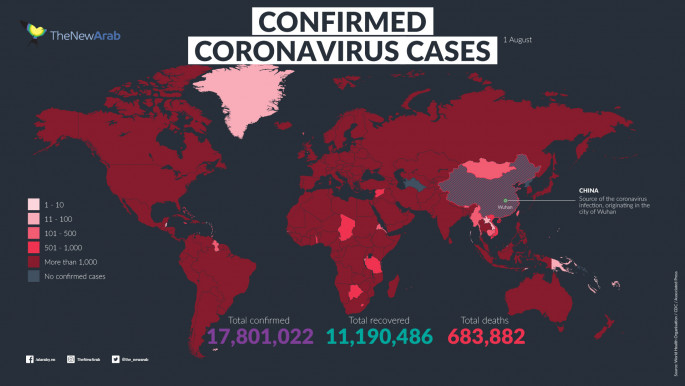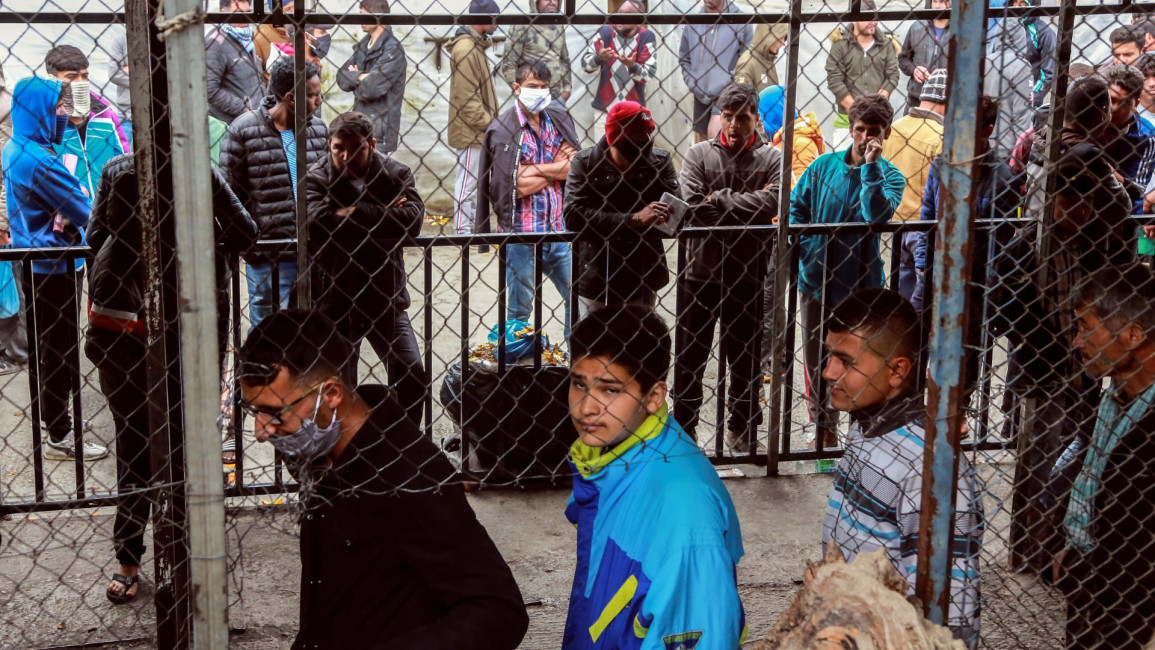Follow us on Facebook, Twitter and Instagram to stay connected
#FreeTheKids campaign urges Greece to release migrant children from camps over coronavirus fears
#FreeTheKids campaign urges Greece to release migrant children from camps over coronavirus fears
Human Rights Watch has launched a campaign urging Greek authorities to release hundreds of migrant children from refugee camps, in a bid to protect them from Covid-19.
3 min read
Migrants and refugees wearing facemasks queue in a camp next to the Moria camp [Getty]
Human rights groups are calling on Greek authorities to release hundreds of unaccompanied migrant children - many from war-torn Afghanistan - currently detained in unhygienic police cells and detention centres in Greece, as fears over coronavirus spreads.
Human Rights Watch has launched a campaign called #FreeTheKids to compel Prime Minister Kyriakos Mitsotakis to release them from “abusive detention conditions” which would “better protect them from infection amid the coronavirus pandemic”.
The campaign calls for the children to be transferred to a safe, child-friendly area.
“Keeping children locked up in filthy police cells was always wrong, but now it also exposes them to the risk of Covid-19 infection,” said Eva Cossé, Greece researcher at Human Rights Watch.
“The Greek government has a duty to end this abusive practice and make sure these vulnerable kids get the care and protection they need.”
According to the National Centre for Social Solidarity, a government body, as of March 31, 331 children were in police custody awaiting transfer to a shelter, a sharp increase from January when 180 unaccompanied children were behind bars.
Human Rights Watch research has documented that as a result, children face arbitrary and prolonged detention and abusive treatment in unsanitary and degrading conditions, including detention with adults and ill-treatment by police.
They are often unable to get medical treatment, psychological counselling, or legal aid, and few even know the reasons for their detention or how long they will be behind bars.
|
Covid-19 has reached the camps
Covid-19 has reached the refugee camps of Greece, with two different migrant facilities in the country now closed for entry and exit after residents in each tested positive for coronavirus.
In the latest case, a 53-year-old Afghan man with pre-existing health conditions in Malakasa camp, just outside Athens, was confirmed ill with the virus.
A few days prior, at least 23 residents tested positive for the coronavirus in Ritsona camp. These cases are the first to be confirmed at a camp in Greece, but there are fears that many more are unreported.
The government has responded by quarantining each camp's residents - with a combined population of over 5,000 people - for a minimum of 14 days.
Zikria Farzad is an Afghan refugee and a teacher. He is also the creator of 'Wave of Hope', a makeshift school created by refugees in Moria camp on Lesbos. He spoke to The New Arab earlier this month about the crowded conditions in the camps.
"For a two-person tent, there are four families, and seven families for container shacks that are designed for two families," Zikria told The New Arab.
The World Health Organisation recommends practising social distancing to curb the spread of the virus, something that’s impossible in these camps.
In the camps, following such guidelines is impossible. "We cannot stay inside because we have to get food, water and go to the bathroom," said Zaki, a nineteen-year-old Afghan in Moria Camp.
 |


![President Pezeshkian has denounced Israel's attacks on Lebanon [Getty]](/sites/default/files/styles/image_684x385/public/2173482924.jpeg?h=a5f2f23a&itok=q3evVtko)



 Follow the Middle East's top stories in English at The New Arab on Google News
Follow the Middle East's top stories in English at The New Arab on Google News


